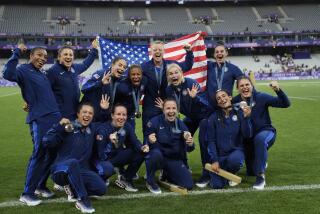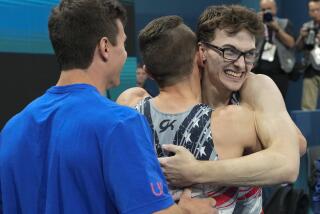Wild Ride Is Worth It for Wescott
- Share via
BARDONECCHIA, Italy — Half a snowboard ...
That was the difference between gold and silver, and between a tremendous boost for a declining sport in the United States and merely a solid one.
And for a veteran snowboarder who has waited eight years to compete in his first Olympics, it was the difference between a glorious conclusion and an admirable one.
Seth Wescott, 29, the pride of Carrabassett Valley, Maine, sped across the finish line Thursday afternoon with Slovakia’s Radoslav Zidek almost literally on his heels to win the gold medal in the new Olympic discipline of snowboard cross.
It was the third gold for a U.S. athlete in as many snowboarding events held so far at the Turin Games, coming days after triumphs by Shaun White and Hannah Teter in halfpipe.
Afterward, Wescott proclaimed his victory to be the culmination of an Olympic dream born in 1998, when he failed to make the halfpipe team -- when halfpipe was making its Olympic debut at Nagano, Japan.
He also predicted that the exciting finish, and triumph by a U.S. athlete, would revive interest in snowboard racing in the United States, just as the success of the halfpipe athletes -- a U.S. men’s sweep in 2002, followed by White’s and Teter’s victories -- brought that discipline to the forefront.
“I’m only seeing it from the U.S. side, but seeing the amount of marketing going into these Olympics based around snowboarding, I think snowboarding is really becoming the heart and soul of the Olympic Games,” Wescott said.
That may be debatable, but few on hand were questioning whether Olympic snowboard cross was a success. The crowd of about 5,000 was far more enthusiastic than those at the halfpipe finals.
The thrilling finish caused some to refer to the duel between Wescott and Zidek as one of the most exciting finals in recent snowboard cross history.
“It was the best race I’ve ever seen,” said Peter Foley, coach of the U.S. team.
On a meandering, jump-filled 3,000-foot course that many liken to a motocross track turned on one end, 32 athletes competed in four-on-four races in three pre-final rounds that amounted to a war of attrition.
There were six crashes in the first eight heats, and so many more afterward that it was pointless to count.
Canadian Drew Neilson, the top qualifier, had his legs swept from under him high on the course during the first round and was thus eliminated.
Xavier Delerue of France, heavily favored, skidded out briefly during his first-round heat and mounted a late charge, but fell a board length short of finishing second, which was what was needed to advance.
On the U.S. side, Graham Watanabe was the first to fall by the wayside, failing to get past the first round. One of the more dramatic moments occurred in a quarterfinal heat involving Nate Holland and Jason Smith.
With Smith leading and Holland and Paul-Henri Delerue close behind, Smith slowed intentionally for a jump, he said, to avoid overshooting the downhill transition upon landing. Holland had to veer briefly but didn’t slow and caught so much air that his board was head-high to Delerue.
Holland crashed upon landing and afterward criticized Smith, saying he felt “like a cat out the window,” but added, “I still should have stuck [the landing] and beat him.”
Delerue, Xavier’s brother, went on to win the bronze. Smith was eliminated in the semifinals and ended up sixth.
Wescott, the 2005 snowboard cross world champion, took the lead, or “hole-shot,” in each of the first three rounds. He started slowly in the final but managed to stay close to Zidek as the two bounded down the course, well ahead of Paul-Henri Delerue and Jordi Font of Spain.
Zidek was taking low lines around the banked turns, while Wescott, calling upon his skateboarding background, preferred the higher lines. Around a banked turn about three-quarters of the way down, Wescott passed Zidek just as they hit a small kicker.
Then they soared over the final jump and Zidek tried to draft behind Wescott, and closed slightly as the two sped across the finish line.
“I found the line and I felt him waiting for my mistake,” Zidek said in broken English. “I tried to overtake him again, but I couldn’t.”
Said Wescott of an Olympic quest that was revived when it was announced that snowboard cross would become an Olympic sport: “I was excited because it was less of a question of whether I could make the team or not, but what I could accomplish.”
More to Read
Go beyond the scoreboard
Get the latest on L.A.'s teams in the daily Sports Report newsletter.
You may occasionally receive promotional content from the Los Angeles Times.






